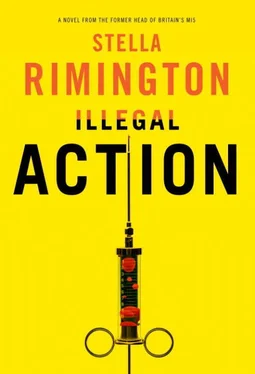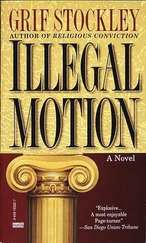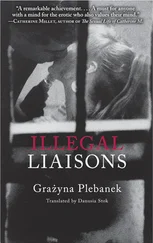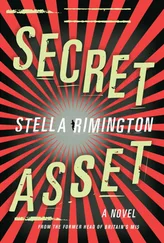It was the last thought he ever had. Greta fired twice, though only the first shot was needed—it hit Michael two inches above his left eye, and killed him instantly.
Maloney recognised the noise from the practice range, though he wanted it to be something else—a car backfiring, a balloon popped by a child; anything other than a gunshot. He was halfway down the hall when he heard it. Lord Jesus, he thought, then said it to himself, like a mantra, “Lord Jesus.”
He was reaching for his holster as he approached the doorway and he stopped momentarily to be sure he had his gun in his hand before he went into the room. He had never, in thirty-seven years on the force, drawn a weapon in anger, and he was relieved to see that his hand was steady. Still, he felt slightly foolish, as his initial panic gave way to doubt—probably he would find nothing more than some people embarrassed by the accidental bang they’d caused.
As he crossed the threshold of the room, his mind registered the body on the floor, crumpled and lying on its back. He realised it was the young lad from London, his eyes staring vacantly towards the high ceiling, a small black hole above one brow. But Maloney took this in only fleetingly, for in the background there was another figure, a woman, dressed smartly.
He would not normally have seen a female as a threat, but he saw the expression on this woman’s face, an expression neither of panic nor shock but of determination. She was holding a pistol by her side and something—he was never able to say what—told him in unequivocal terms that she was going to shoot him dead. He held his arm out to its full length, and just as he saw her weapon start to swing up, he squeezed the trigger of his own gun.
The noise and kick of the explosion surprised him, so much that he almost fell backwards. Recovering, he saw the woman drop the pistol, and his eyes watched with perverse fascination as it landed on its metal butt, bounced on the large Oriental rug, freakishly bounced again, then was suddenly smothered by the body of the woman as she collapsed on to the floor.
The first thought that came into his head—though he was to tell no one this, not even his wife—was: that wasn’t so hard. But then he fell to his knees, literally knocked down by the realisation of what he had done. Lord Jesus.
I vow to thee my country—all earthly things above—
Entire and whole and perfect, the service of my love…
The love that never falters, the love that pays the price,
The love that makes undaunted the final sacrifice.
As they sang the hymn Liz noticed the brown-haired girl in the second row of pews. She was crying silently, tears streaming down her face. A university friend of Michael Fane’s? Perhaps even a girlfriend. More likely an ex-girlfriend, since she wasn’t sitting with members of the family—Geoffrey Fane, his former wife and an elderly woman Liz assumed must be a grandmother—in the front pew. The new French husband of the former Mrs. Fane had thought it politic not to make an appearance. So, less forgivably, had Brian Ackers.
They were in the Chapel of the Order of St. Michael and St. George, located inconspicuously off the long nave of St. Paul’s Cathedral, separated by beautiful brass and iron grill doors. It was a small haven in a vast public space, though occasionally noise drifted through from the cathedral, which even on a weekday morning was streaming with tourists.
The chapel seemed to Liz a strange choice for a service for someone as young as Michael. A choice made presumably by Geoffrey Fane, whose CMG, given to him fairly recently for his counter-terrorist work, would have entitled him to have his son’s memorial service there. “Call Me God” as the award was known frivolously, given for significant service to the state in the foreign arena. Both the honour and the chapel represented an Establishment Michael Fane would never make his mark on. Liz felt uneasy at the unstated implication that they were mourning the death of a future English leader, when she knew all too well that Michael Fane had not been making the grade. Maybe if he’d lived he would have done well. Certainly his last act had been brave, though also headstrong.
There were two readings—the first from Leviticus given by a school friend of Michael’s, who read in a low sonorous voice, like a much older man. Then the girl Liz had spotted crying got up and came forward. She read from Ecclesiastes—“Remember now thy Creator in the days of thy youth”—starting so jerkily that for a moment Liz feared that her emotions would overwhelm her. But the girl seemed to take hold of herself and read simply and movingly to the end of the verse: “Vanity of vanities, saith the Preacher… all is vanity.”
An image flashed before her, of Michael’s body lying on the drawing-room floor. The woman she knew as Greta also lay dead nearby. Liz had been freed just seconds before, by an Irish policeman who’d been holding a gun, ready to fire.
How easily it could have gone another way. Instead of attending this memorial service Liz would be sitting in her office in Thames House, trying to stay patient with Michael Fane’s countless suggestions, becoming mildly amused when Peggy proved less successful in controlling her own irritation with the man. Man? He’d been a boy, really, Liz thought now with sudden sadness.
“If onlys” continued to play a game in her head. If only Brian had agreed to her coming out of the Brunovsky house, though that was not the sole cause of these might-have-beens. If only she had seen through Brunovsky himself, sensed from his carefree, sometimes madcap behaviour that he knew he wasn’t in any danger at all. She supposed, too, that her scepticism about a plot had blinded her to Greta, with hindsight clearly not what she pretended to be. They’d been looking for an Illegal, though frankly there had never been any real reason to suspect there was one—and certainly not in Brunovsky’s circle.
She stopped the “if only” game. That way led to recrimination and guilt, neither of which would change anything now, least of all the death of Michael Fane. Liz had long ago learnt that if you did your best, that was all you could do—that, and try to learn from your mistakes. A cliché, perhaps, but no less true for it.
You had to hand it to Brunovsky, she thought, as a speaker walked slowly towards the lectern, set in front of the modest altar. The oligarch had managed to flee Ballymurtagh in the most dramatic way—escaping in the same helicopter that had brought Morozov there. Interviewed by the Garda later that evening, the shocked pilot explained how the Russian had come sprinting across the lawn behind the house and jumped straight into the helicopter’s passenger seat. When the pilot had protested, this new passenger had stuck a derringer to his head and ordered him to start the engine.
One hour later they had set down in a park on the southern outskirts of Dublin, not far from the Martello tower of Joyce and Ulysses fame. Backed by the pistol, Brunovsky had ordered him to take off on his own. As he’d hovered briefly 400 feet up, the pilot had last seen the Russian getting into a large black car waiting at the edge of the park.
It could not have been planned—Liz was certain that Brunovsky had expected to return to England with her, establishing an unbreakable alibi for the kidnapping of Morozov—but there must have been a fallback. He’d have been helped, possibly, by the Russian Embassy in Dublin. Or perhaps by some sympathisers—that seemed unlikely, but then so had the idea of an Illegal until Greta had proved otherwise.
In any case, the oligarch had disappeared without trace. No one resembling his description had gone through any of Ireland’s thirty-six airports, despite intensive scrutiny from both the Republic and the Northern Ireland aviation authorities. A search of maritime passenger lists had proved equally barren. Was it possible that the Russian had remained in Ireland, waiting for the situation to calm down before making his move?
Читать дальше












